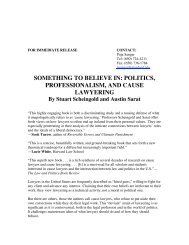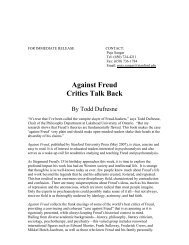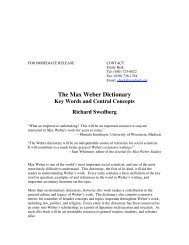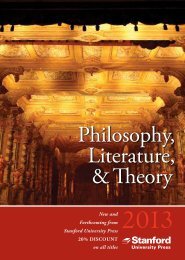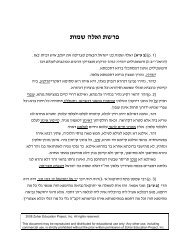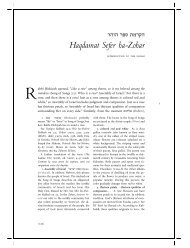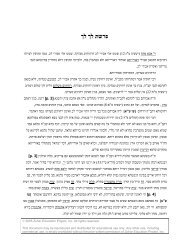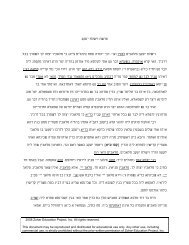Front Matter (PDF) - Stanford University Press
Front Matter (PDF) - Stanford University Press
Front Matter (PDF) - Stanford University Press
Create successful ePaper yourself
Turn your PDF publications into a flip-book with our unique Google optimized e-Paper software.
``Eden'' (or ``Lebanon'') whence that ¯ow is to come is an accessible if<br />
The<br />
rungwithin the divine and human self. It is not just an ancient and lost<br />
hidden<br />
of the biblical tale, nor is it only the ``paradise'' to which souls will ascend<br />
site<br />
death. Eden is the ``upper world,'' a recondite and inward aspect of being<br />
after<br />
is mirrored in the ``garden,'' the One who needs to be watered by that<br />
that<br />
We creatures of the ``lower world,'' trees growing in the garden, need to<br />
¯ow.<br />
back the course of that river to its source, linkingthe upper and lower<br />
trace<br />
(Binah and Shekhinah, but also Shekhinah and ``this'' world, or Shekhinah<br />
worlds<br />
the soul), so that the ¯ow will never cease.<br />
and<br />
these nature-evokingverses takes us back to the typically<br />
Re¯ectingon<br />
settings of the companions' conversations, which we have mentioned<br />
outdoor<br />
These settings represent the varied topography of the land of Israel as it<br />
earlier.<br />
in the authors' imagination, including deserts and vast, forbidding<br />
existed<br />
as well as fertile oases and spring s of water. The lush mountains arden, g<br />
as evoked in the Songof Songs, is a particularly characteristic setting<br />
especially<br />
inspire such conversations. This may be connected to the much older desig-<br />
to<br />
of the ``place'' of mystical speculation as pardes or ``orchard.'' But it is<br />
nation<br />
also to the verses quoted here and to the series of connected gardens in<br />
related<br />
the kabbalist sees himself as dwelling. This world is a lower garden,<br />
which<br />
to be watered by sources from above, ultimately by the love<br />
needingconstantly<br />
But She too is a garden, nurtured<br />
andsustenancethatisthegiftofShekhinah.<br />
the river than comes forth from the hidden Eden, itself also a ``garden'' in<br />
by<br />
unknown, mysterious way. Somewhere between this world and Shekhinah<br />
some<br />
the ``Garden of Eden'' that contains the souls of the righteous, both<br />
stands<br />
who have completed their time on earth and those not yet born. It too is<br />
those<br />
into ``upper'' and ``lower'' sections, described in various mythic ways.<br />
divided<br />
of these gardens are linked to one another. The kabbalist sitting and<br />
All<br />
with his companions in an earthly gardenÐphysically in Cas-<br />
studyingTorah<br />
but imaginatively in the Holy LandÐis aware that at the same moment the<br />
tile,<br />
in the Garden of Eden are also engaged in such study. Their garden<br />
righteous<br />
open from above, because it is taught that God Himself descends into that<br />
is<br />
to take delight in the souls of the righteous. All of these point still<br />
Garden<br />
toward the se®rotic gardens, and all these levels of the imagination<br />
higher,<br />
and enrich one another. The sweet aromas risingfrom these gardens<br />
fructify<br />
play a role in the descriptions of mystical intoxication frequently found in<br />
also<br />
Zohar's pages.<br />
the<br />
unique genius that ®nds expression in the Zohar has everythingto do with<br />
The<br />
Its homiletical style builds upon midrashic sensitivity to the nuances<br />
language.<br />
biblical language, and often seeks to go beyond it. Underlying every page of<br />
of<br />
Zohar's readingof Torah is a rich ``ear'' for associative links and plays on<br />
the<br />
Introduction<br />
lxix<br />
IX



